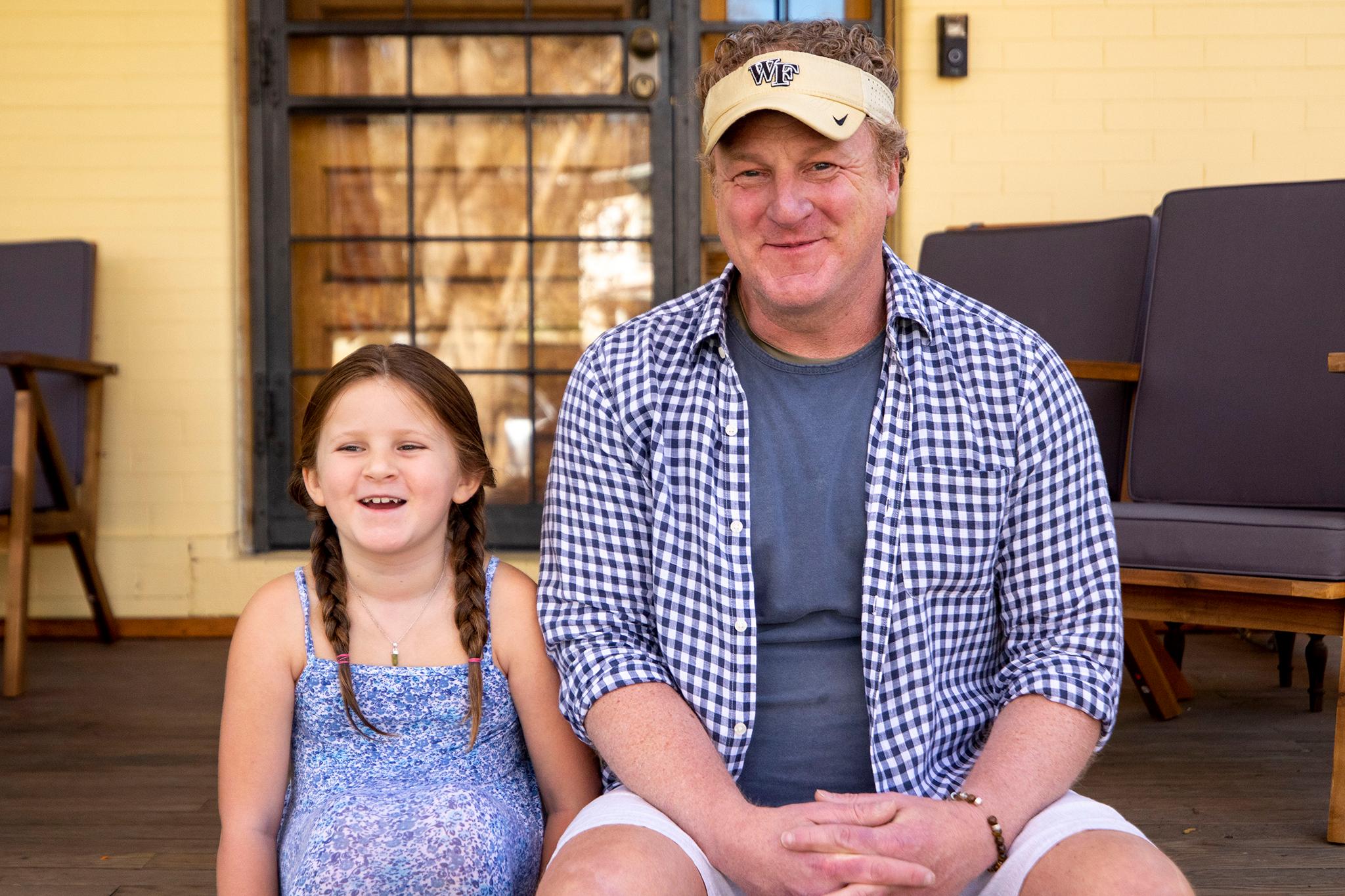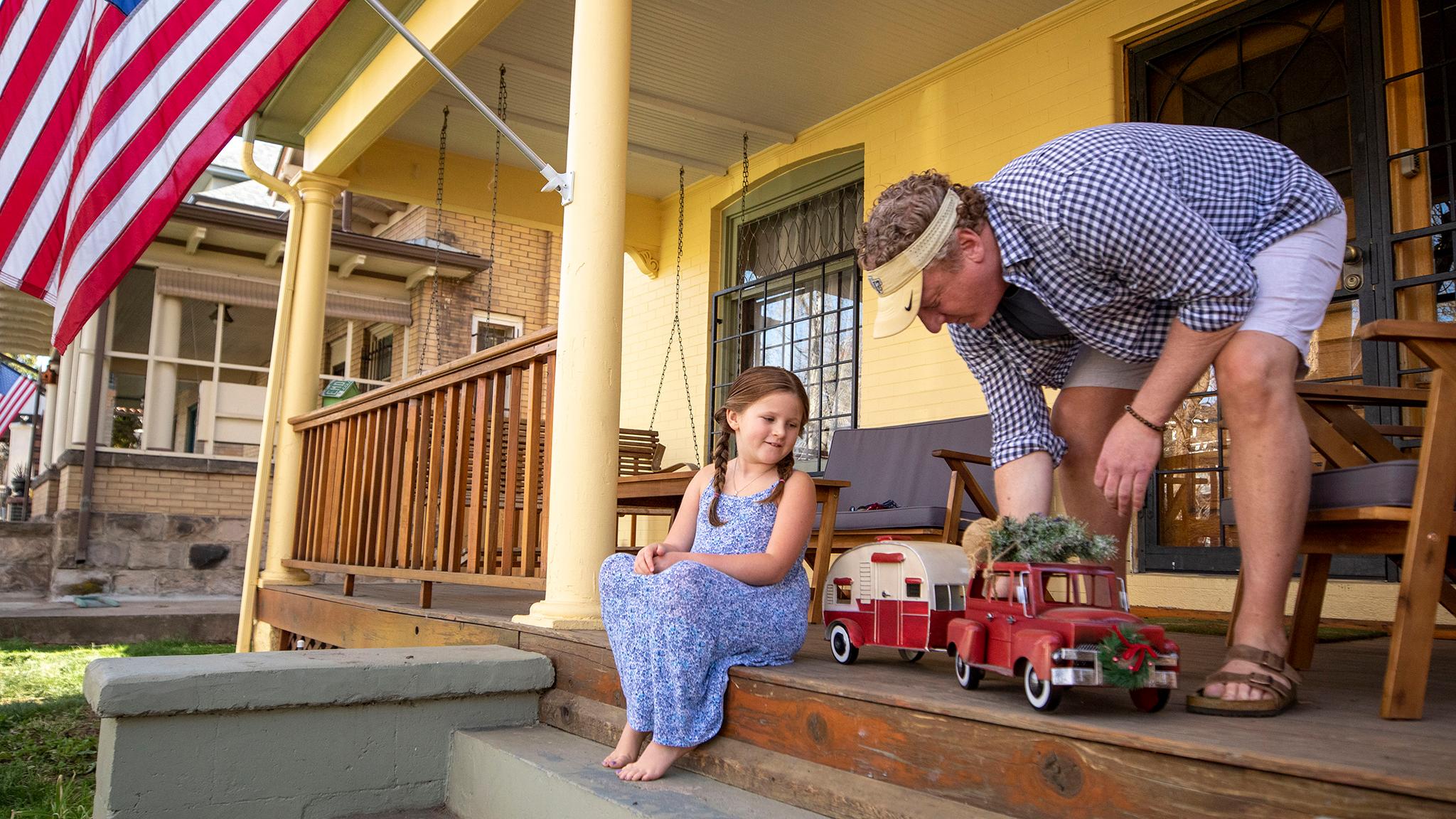On the job as a respiratory therapist at Children's Hospital Colorado, the precautions Hailey Martin takes against the novel coronavirus include having her temperature checked every morning and donning full-body protective gear, including a face shield, when she's with patients.
Off work, her precautions include living in a stranger's house in Congress Park.
Some Colorado healthcare workers such as Martin who are concerned that they might bring COVID-19, the potentially fatal disease caused by the coronavirus, home to vulnerable loved ones have been connected to alternative housing by Woody Faircloth. The Denver telecommunications company manager -- who describes helping others as, in part, a way to heal from a divorce -- has done humanitarian work with Syrian refugees in Greece and been involved in emergency housing since 2018. Faircloth was so moved by the devastation wrought by fires in northern California in 2018 that he formed a nonprofit to get RVs to people who had lost their homes in that disaster.
Faircloth started collecting and donating RVs after seeing news reports from California. The inspiration for the effort he calls Housing Covid Heroes came from closer to his home near City Park.
A neighbor of Faircloth who is a Denver Health emergency room doctor told him about conversations with friends in Italy, a country hard-hit by the coronavirus.
They "painted a pretty bleak picture of what we're in store for here," Faircloth said.
The neighbor spoke of her concerns about infecting her husband, who has asthma. The neighbor could afford a hotel, but Faircloth thought that other health workers with fewer options must be in similar situations.
Faircloth called Anna Segur. He had met Segur, who works at the University of Colorado's Boulder campus and has international experience in development and aid, through a project he was involved in to help Syrian refugees in Greece.
"Our experience ... helping in crisis came in handy," Faircloth said.

Faircloth and Segur used the online infrastructure they built for the RV project for Housing Covid Heroes. Segur built intake forms. They get copies of the medical credentials of the recipients and verify donors' information, Faircloth said. So far, they have matched 15 healthcare workers to housing, in some cases vacation rentals that were empty amid the pause in tourism created by the pandemic.
Faircloth also is executive director of RVs 4 MDs, a national project to loan recreational vehicles that medical workers can park at their own homes, allowing them to isolate during the pandemic without being far from family.
They've been spreading the word on social media. That's where Karina Handoyo heard about the project.
Handoyo is a doctor in a small practice at Presbyterian St. Lukes Medical Center. Two of her partners have spouses who have weakened immune systems. Handoyo also trains students from the University of Colorado Denver Anschutz Medical Campus and often sees emails from residents concerned about the coronavirus and seeking housing, she said, "so that they can hopefully not bring this home to their roommates."
Handoyo posted a query about housing on Nextdoor. Faircloth responded.
"I've been surprised at how willing the neighbors have been to donate their houses," Handoyo said. "People just want to contribute. We in healthcare have a very specific duty. People in the outside world are trying to find ways to help. It is a way for them to help society."
Jeanette Liang also connected with Housing Covid Heroes through Nextdoor. She responded to a post from someone else about trying to start such a project, and Faircloth got in touch with her.
"He matched me with someone within a few days," Liang said.
She said she had been reading in the newspapers and hearing on TV about the housing challenge medical workers have faced during the coronavirus outbreak and "just felt like I was in a position to help someone."
Liang spoke by phone from a home she owns in Breckenridge where she's been staying after leaving her Denver house to Martin, the respiratory therapist.
Martin is buying a home in Buckley that is still under construction. The single mother of an eight-month-old son had been living with a friend in the Denver suburb of Frederick when the coronavirus arrived. Her host has a weakened immune system. At first, Martin tried to protect her friend by taking such steps as wearing a mask in the house. It quickly became clear she needed to move.
"I needed a place to stay, and I needed to find it quickly," Martin said.
She asked co-workers if they had any ideas and was directed to a web site with resources for healthcare workers. She found Faircloth's contact details. He responded to her message within an hour.
Faircloth and Liang were "both very quick to respond, very quick to get me into housing," Martin said. "I couldn't be more grateful to either one of them."
Martin has heard the howling organized to show support for medical workers and has seen people come to her hospital to donate meals to the staff.
"Coloradans are definitely always wanting to help," said Martin, a Colorado Springs native who came to Denver after a stint in the Navy and school in San Diego.
As soon as she reaches the hospital for each of the 12-hour shifts she works three days a week, Martin is handed a mask, asked whether she's having any symptoms of a respiratory illness and screened for high temperature. At the end of a shift, she leaves her protective clothing behind and walks to the parking lot, where she takes off her work shoes and wipes them with bleach and sprays them with disinfectant before sealing them in a plastic bag she leaves in her car until the next day.
At the start of her days off, Martin showers and wipes down her car with bleach before collecting her son Atticus from his father, who does not live with them.
Liang's home is "a safe place," Martin said. "It was a huge stress relief to get housing as quickly as I did."
Martin is meticulous about cleaning Liang's home. She even mows the lawn.
Martin and Liang have only spoken by phone. Liang said she has no qualms about the arrangement.
"There's just not a whole lot to worry about," Liang said. "It's kind of a leap of faith. You've just got to trust people."
An engineer whose husband is retired, Liang has been working from home, whether in Denver or Breckenridge, since the coronavirus stay-at-home was ordered. She said her company is flexible about when she might have to return to the office in Denver, so she can be flexible about Martin's stay. Martin said she expects to be able to move into her Buckley home no earlier than mid-June.
Her commute from her friend's house in Frederick took her 20 minutes each way. Liang's home is closer to Children's.
"I can get a little more sleep," Martin said.
Correction: A previous version of this story incorrectly characterized Faircloth's international work. He worked with Syrian refugees in Greece.














